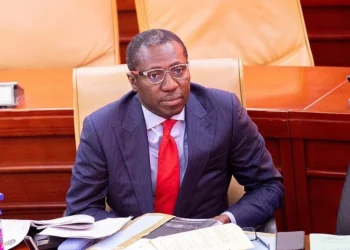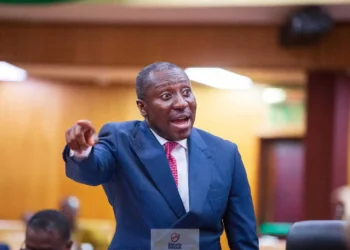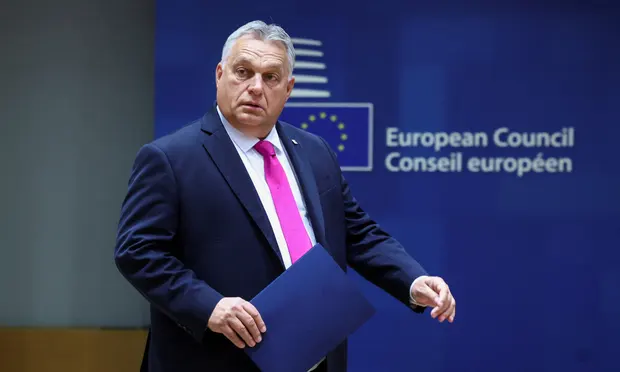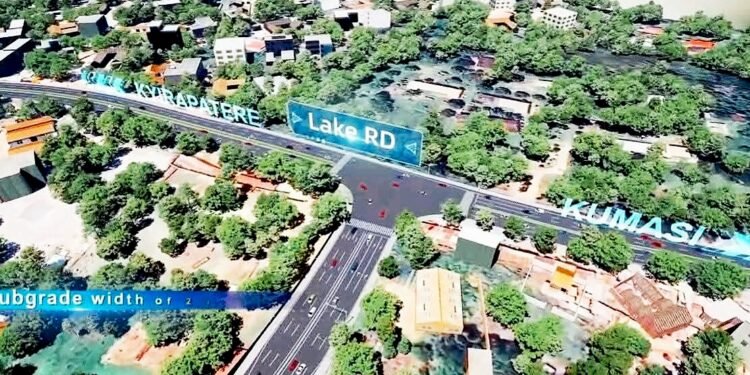The Minister for Roads and Highways, Hon. Kwame Governs Agbodza, has assured Ghanaians that all projects under the government’s ambitious “Big Push” road infrastructure programme are expected to be completed within two years.
The Minister emphasised that the timelines are not merely aspirational but contractual, with clear enforcement mechanisms designed to prevent delays and ensure quality delivery.
According to Hon. Agbodza, each of the thirty-two major road projects under the initiative has been strategically packaged and awarded in lots based on the technical capacity of contractors to ensure they are completed within a maximum duration of 24 months.
This, he said, is part of a broader commitment by the government to deliver efficient and timely infrastructure as a pillar of the national 24-hour economy agenda.
“Completing 50 kilometres of road properly is much more complicated than people think. But most of the contractors only look at the money. They say, ‘Oh, if I do 100 kilometres, it’s two billion cedis.’
“So, they are looking at the money, not the technical and resource requirements. That is why we are breaking the contracts down into lots that can be handled within two years.”
Minister for Roads and Highways, Hon. Kwame Governs Agbodza
Hon. Agbodza stressed that the era of long, delayed projects is over, stressing that going forward, all Big Push contracts will be strictly governed by new clauses that demand timely performance.

“The contract is for twenty-four months—from start to finish, including handing over. We are writing into the contract that if you delay for three months without any justification, we will terminate the work immediately without any further notice.”
Minister for Roads and Highways, Hon. Kwame Governs Agbodza
Seriousness of the New Contract Regime
The Minister underscored the seriousness of the new contractual framework, explaining that in the past, the process of terminating underperforming road contracts could take over six months due to bureaucratic delays and legal hurdles.
“Now they don’t have to agree, I am writing the contract for them to sign. That’s why we say you do this project under the 24-hour economy model. So you work 24/7.”
Minister for Roads and Highways, Hon. Kwame Governs Agbodza
He clarified that contractors are not being forced into these new terms. “You are not compelled to take this project if you have issues with it; you take it knowing very well that these are the conditions.”
Hon. Agbodza disclosed that the Ministry expects all the road contracts—except for one, the Dambai Bridge—to be signed by August this year. By September, he noted, contractors are expected to be on-site and fully engaged in the execution of their projects.
“By September 1st, we expect contractors to be working. Exactly. So that by September 1st, 2027, they should have finished handing over.” This renewed sense of urgency and structure marks a significant shift in how road projects are managed in Ghana.

The Big Push agenda, which forms part of President John Dramani Mahama’s broader infrastructure and economic reset programme, aims to use strategic public investment to stimulate job creation, boost productivity, and reduce transport costs nationwide.
Hon. Agbodza also hinted that this approach is reflective of the government’s commitment to ensure value for money and decentralised development.
The 24-month delivery timeframe for each project is not just a matter of good governance, he said, but also a response to the concerns of ordinary citizens who often bear the brunt of delayed and substandard infrastructure projects.
In this regard, the Minister’s remarks signal a clear departure from the past, where, in many instances, road projects were awarded without adequate consideration of the contractor’s capacity or the state’s financing capabilities. The result was often long delays, bloated budgets, and subpar outcomes.
With this new model, the government is betting on firm timelines, accountability, and a sense of urgency to reset the narrative around road infrastructure delivery.

The Big Push programme has already attracted national attention, not only because of its scale and the number of communities it is expected to impact but also because of the government’s commitment to transparency and inclusiveness in its rollout.
As the September 2025 mobilisation date draws near, Ghanaians will be hoping to see whether this bold new approach can deliver on its promise to reshape the country’s road network and serve as a catalyst for broader economic transformation.
READ ALSO: Lands Minister Extends Mining Licence Rectification Deadline to August 2025























